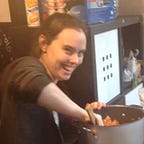Economic Inequality Breeds Pandemics
Service industry jobs, such as food service, generally do not have sick days. They generally do not have the health insurance to see a doctor, but often require doctor’s notes should you miss work. Workers often are responsible for finding their own shift replacements. They generally aren’t paid enough to let people take unpaid leave, and even when they do, it is common practice to fire people who don’t do enough shifts a month.
Even if the employee just broke their ankle (and can somehow afford to go to the doctor’s without insurance), they’re much more likely to be exposed to sick people when they go get that doctor’s note.
People working service industry jobs are also the ones who prepare our food, who ring up our groceries and stock the aisles, and who care for our elderly. The gig economy jobs don’t have it any better.
None of these people can stop working. So, they probably won’t stop working no matter how sick they get. Whatever they have will spread wherever they go.
Normally pointing out the poor quality of the life of the working class dissolves into deflection about education, hard work, and bootstraps. However, even if these answers were legitimate, they are not relevant for modeling a pandemic. Regardless of how worthy you believe poor people are or are not, these are their working conditions. If we do have a pandemic, these working conditions spread the disease. Spreading the disease will impact the quality of life of every member of our society.
We have already seen this play out on the cruise ships. While the passengers can be confined to their mostly individual rooms, the crew continues to work, interacting with hundreds of people a day. Then, regardless of who they have been caring for, they eat in a cafeteria together and go back to their shared rooms. The crew’s work environment breeds disease, they wind up very sick, and this is bad for the passengers too. That is how it played out on the Diamond Princess. Now we have an additional 3 cruise ships of people facing similar conditions.
We should also consider the growing number of homeless Americans. They can not be quarantined in their homes because they have no homes. They are, at best, put in densely populated homeless shelters, and often put in jail or prison.
Homeless shelters, jails, and prisons are a perfect recipe for disease. Even if you like being crummy to homeless people or people guilty of crimes, jail additionally holds people who are not yet convicted (aka, generally “presumed innocent until proven guilty.”) Both jails and prisons are a current concern for public health officials due to issues such as population density, overcrowding, a lack of sanitation, and poor medical care.
People in prison are convicted, and you rely on them. The State of California blamed a lack of wildfire fighters on prison reform. Colorado is relying on prisoners to make up for a farm labor shortage. We are currently relying on prisons in NYC to meet our needs for hand sanitizer.
Prisons are not known for their own strong medical systems. Hand sanitizer, for example, is often considered contraband due to its high alcohol content. There are also often more immediate health issues. If our capacity to fight wildfires, grow crops, or produce hand sanitizer drops due to massive numbers of prisoners becoming extremely sick, that will impact a lot of people.
We should also consider how the poorest people in our country make a living. Human blood products make up 1.4% of America’s exports. This does not even count the massive domestic demand. People selling blood products are often the most financially desperate among us: generally the working poor, the homeless, single parents, disabled persons, and college students. Donating blood compromises the immune system and makes people more prone to infections. After the donors compromise their immune systems in financial desperation, they too will return to work, often at service or gig jobs. They will be the population least likely to be able to afford to miss shifts, and one of the populations most likely to get sick.
Our economic inequality has literally become a breeding ground for disease. No matter how carefully you conduct yourself, every additional sick person increases the risk that you catch something. Even if you are so wealthy that you can somehow buy yourself isolation, every sick person increases the chance of economic instability. Cases are barely getting started in most countries, and the stock market has already been a roller coaster for the last two weeks.
It is in your personal best interest to see a better quality of life for the poor. Whether this pathogen scare or the next, we are all in this together far more than we realize.
